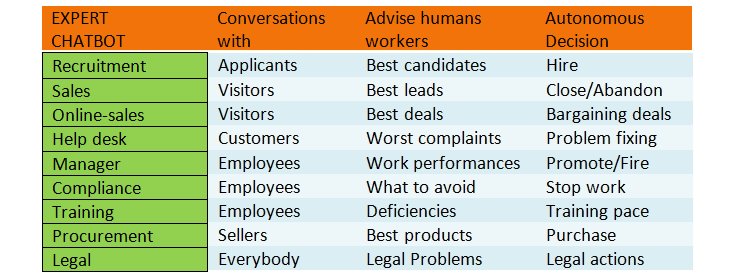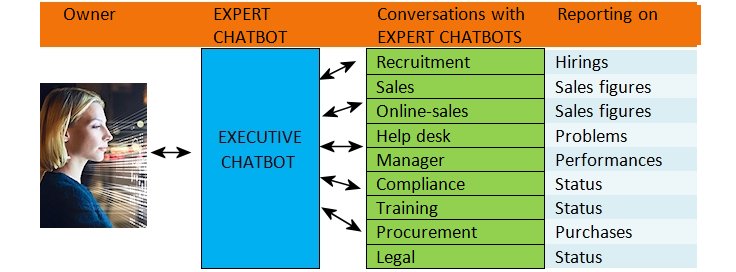We are not too far away from creating a completely digital business with a single human (the owner) setting it up. A recent Forbes article mentions the possibility of replacing managers in a futuristic tone encouraged by the advances in blockchain and IoT, A Harvard Business Review article introduces iCEO, a software that makes executive decisions. All these developments are taking us to this ultimate goal.
Autonomous Digital Business is a concept much closer to reality than chips in the brain, or self-driving cars on the streets.
Current businesses are already “digital” in so many aspects. Automated trading in stock market was a pioneering example of how buying and selling decisions can be delegated to smart computers, and they have been operating for a while now. If we can trust computers with stock trading, why not trust them with our business decisions for buying, selling, hiring, etc.?
Amazon, for example, might be rated 70% digital considering all its web operations and robotic warehouses. As conversational agents (chatbots) steadily penetrating into the CRM and sales operations, the percentage of digital business is increasing. But can it be all “digital” comprised of agents and expert chatbots? Can we delegate all decision making roles to computerized agents to run our businesses?
Expert Chatbots Making Decisions
Our current understanding of the chatbots is not sophisticated enough to make them run a business autonomously. However, “expert” chatbots are a different ball game. I had explained in an article earlier how they differ from conventional chatbots. In a nut shell, an expert chatbot communicates with humans plus makes decisions based on the expertise it has. At exClone, we have seeded the first steps of this vision.
In the short term, the following decisions can be expected to be made from AI agents/expert chatbots in the realm of digital business:
This is a simplified view of all possible conversational decision systems applicable to businesses. In this simple model, the business owner would interact with an executive chatbot to control and manage her business.
This picture depicts a digitalization scheme via AI in its most naive form, with a potential to signal what the future holds.
Barriers to Entry
The most important parameter in this transition is the ability to create expert chatbots easily without deploying expensive scientific projects. Here is the list of 10 requirements to win in this race:
1- No coding effort should be required.
2- Deployment should be fast (as opposed to lengthly training/learning procedures)
3- Data requirement should be limited to the content of the expertise (as opposed to vast amounts of training data to be collected)
4- Easy to fix and modify (as opposed to black box approaches that require re-training the system)
5- Building an expert chatbot must be an editorial effort, not much different than writing a blog post.
6- Builders of expert chatbots should be experts themselves without the involvement of developers or scientists.
7- Should be able to converse effectively, yield reasonable advice, and make sensible decisions.
8- Must have a certain level of awareness to be able to analyze its conversations and make deductions.
9- Must be able to learn from overall operation by evaluating its objective function.
10- It should be easily deployed in all communication channels/platforms ranging from SMS to Slack.
The winning development platform must address all the issues listed above. Most of the current platforms offered by big corporations (Microsoft, Google, IBM, Amazon, Facebook) do not meet half of these criteria, and are targeted solely to developers, not to business experts.
How will the Future of Business Look Like?
There are several measurements that apply to business valuation today such as the market cap, EBITA, gross revenue, number of employees, etc. But none of these conventional measurements indicate how close the company is to scaling upward. The rate of digitalization could be such a measurement to fill in this gap.
A new key measurement of company valuation in Wallstreet will be the “Rate of Digitalization” in the near future.
Consider Amazon again. Let’s imagine a rival, equal size, equal volume, but everything done by hand (human labor). Who would you invest in? Amazon or the rival? Knowing the degree of digitalization in Amazon, the natural choice would be her. This extreme hypothetical example emphasizes the value of this new parameter. Today, it is all blurred in the narrative interpretations of stock analysts.
Far into the future, it is fair to assume that Fortune 500 list will start to include businesses entirely digital (automated) with few human owners or controllers.



